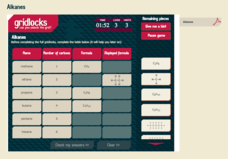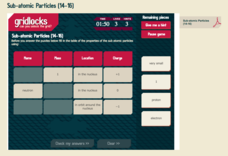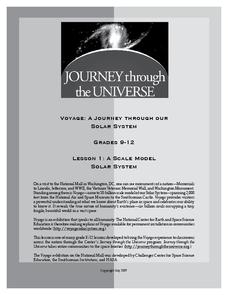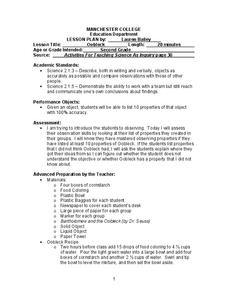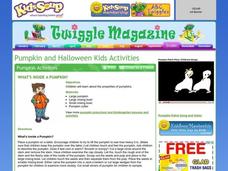Polar Trec
Ice Cores: Modeling Ice Sheets
Ice cores provide scientists with knowledge of historic melt layers, air temperatures, greenhouse gases, and climate stability. Scholars work in groups to build layers representing snow and ice over thousands of years. Then, groups...
Royal Society of Chemistry
States of Matter 1
Do solids, liquids, and gases even matter? Scholars match the state of matter to its particle picture, size and shape description, and description of the arrangement of the particles. Once they complete that activity, they complete a...
Royal Society of Chemistry
Alkanes
Alkanes contain only single bonds and have no functional groups. Scholars match the properties of six alkanes in a series of four puzzles. Problem solving and logic help cement the concepts with repetition.
Royal Society of Chemistry
Sub-Atomic Particles (14-16)
In 1897, J.J. Thomson discovered the electron, the first subatomic particle proven to exist. Scholars review their understanding of electrons, protons, and neutrons as they work through the puzzles. Each puzzle connects two or three...
Noyce Foundation
Granny’s Balloon Trip
Take flight with a fun activity focused on graphing data on a coordinate plane. As learners study the data for Granny's hot-air balloon trip, including the time of day and the distance of the balloon from the ground, they practice...
Journey Through the Universe
A Scale Model Solar System
Between the time scientists discovered Pluto and reclassified it as a dwarf planet, it did not even make one full revolution around the sun. In two activities, scholars investigate scale models and their properties. Pupils find that it...
Discovery Education
How's the Weather?
Young meteorologists explore different aspects of the weather while learning about measurement devices. They build instruments and then set up a weather station outside and measure temperature, humidity, air pressure, wind speed, and...
Curated OER
Understanding the Water Cycle
Investigate the water cycle and how water moves from the land to the air and back to the land. Create a terrarium and observe the water cycle at work. Define weather terms including evaporation, condensation, and precipitation.
It's About Time
Volcanic Hazards: Airborne Debris
Pupils interpret maps and graph data related to volcanic ash. Then they analyze the importance of wind speed and the dangers of the ash to both life, air temperature, and technology.
LABScI
Viscosity: The Fluid Lab
There's more to fluids than meet the eye—they include gases, liquids, and polymers, too! Scholars complete three hands-on activities exploring different properties of fluids. They explore viscosity by measuring the resistance, or...
Curated OER
Weather
In this weather learning exercise, students will match 4 weather terms to their correct definition. Vocabulary words include wind, weather, air mass, and front. Then students will complete 3 short answer questions based on high and low...
Curated OER
Every Breath You Take
Students explore the nature of the air we breathe by observing petri dishes that have accumulated particulate matter from the atmosphere. Students make mathematical calculations and inferences about the effect of this matter on...
Curated OER
Aeronautics: Bernoulli's Principle
Students explore physics by participating in a science activity in class. In this flight properties lesson, students identify Bernoulli's principle of flight and his theory of statics and motion. Students conduct a demonstration by...
Curated OER
Force and Gliders
Learners explore physics by creating data graphs in class. In this flight properties lesson, students read the book Flying Machine and identify the force, resistance and construction necessary to keep a glider in the air. Learners...
Curated OER
A Hands-On Paper Activity Examining The Relationship Between Hierarchical Levels Of Structure And Function
Students investigate how complex functions arise in biological systems through the creation of several paper structures to accomplish various tasks such as remaining suspended in air for the longest time, making the loudest noise and...
Curated OER
Oobleck
Second graders observe the properties of Oobleck. In this science and observation instructional activity, 2nd graders examine Oobleck and make a list of 10 properties that they notice. They explain their observations.
Curated OER
Introduce Solids
Young scholars identify and interpret a variety of solid materials - cloth, wood, metal, plastic, paper, and rubber. After a period of free exploration, they then describe the properties of the objects and develop vocabulary in order to...
Curated OER
Experimenting with Sound
Students explore physical science by completing a worksheet. In this sound perception lesson, students collaborate in small groups to research sound properties on the Internet and in libraries. Students conduct a listening experiment by...
Curated OER
Sixth Grade Science Test
In this science activity, 6th graders take a multiple choice quiz about matter, properties, electricity, and more. Students complete 30 questions total.
Curated OER
Rock Cycle SIOP Unit
Students collect rocks, identify them, classify them, investigate their properties, and more. In this rocks lesson plan, students also experiment with soil and erosion and weather.
Curated OER
What's Inside a Pumpkin?
Students explore the properties of a pumpkin. In this What's Inside a Pumpkin lesson plan, students use a real pumpkin to investigate pumpkin facts, sing a song "Five Little Pumpkins", paint pumpkin patch artwork, participate in a...
Curated OER
Properties of Matter
Young scholars describe four states of matter and their characteristics, explain thermal expansion of matter, interpret state changes in terms of kinetic theory of matter, explain relationship between temperature and volume of a gas,...
Curated OER
Particulate Matter: How Dirty is the Air We Breathe?
Fourth graders create a simple testing device and collect and observe the pollution in the air we breathe.
Curated OER
Understanding Waves
Learners examine the physical properties of waves to explore the word crest and trough. They use toys to study waves in air, water and light.
Other popular searches
- Air Properties
- Science Properties of Air
- 4 Air Properties
- Properties of Air Powerpoint
- 5 Properties of Air
- Kindergarten Air Properties
- Air Properties Stations




